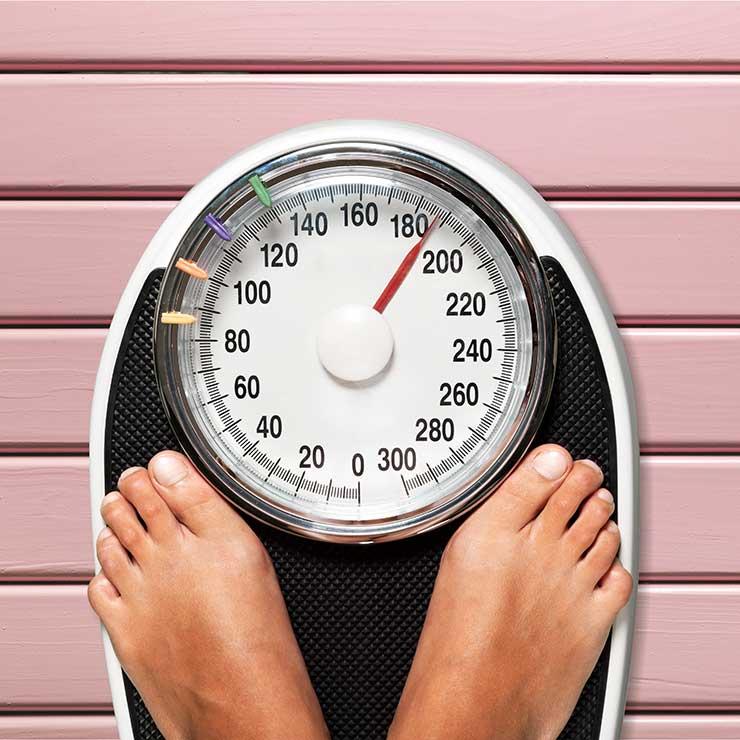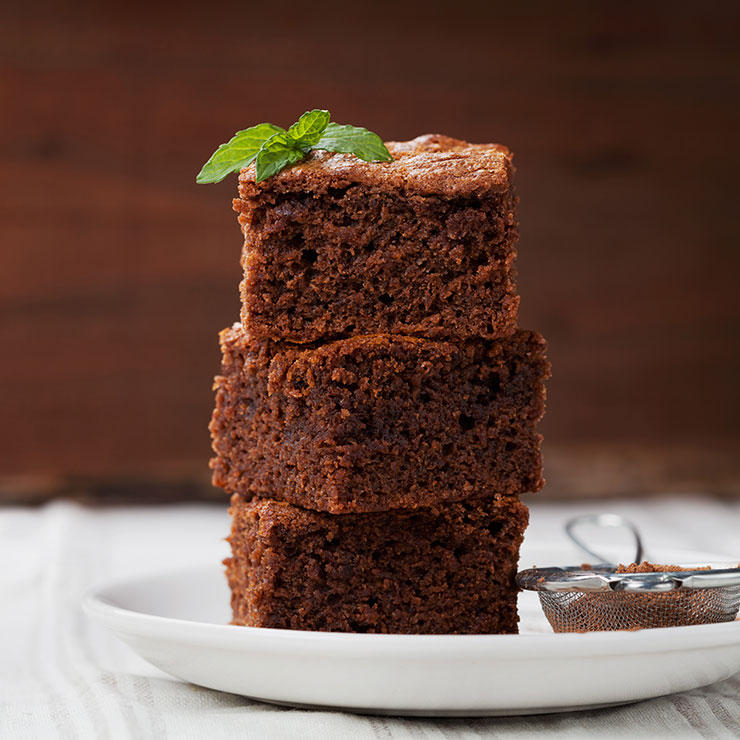Anyone who struggles to lose even a few pounds knows that it isn't easy. And once you do hit your goal weight, it can feel even harder to maintain that new size. Studies show that losing significant amounts of weight fundamentally changes your metabolism, slowing it way down. Such a change means that your body burns fewer calories than it would if you'd never lost weight, or had always been thin. Essentially, your body tries its best to put the pounds right back on.
So it's really no surprise that maintaining any weight loss is a constant battle. "There's no end," says Lindsey Briand, who lost 100 pounds and has kept it off for 15 months. "It's a constant journey of reevaluating your diet and your exercise routines, and figuring out what works for your body and lifestyle."
Still, Briand and women like her have found ways to keep the pounds at bay. We talked to her and six others who've lost 100 pounds or more about how they maintain their new size. Here are their best tips.
(Lose up to 25 pounds in 2 months—and look more radiant than ever—with the new Younger In 8 Weeks plan!)
Start
 1/12
They rename their scale.
1/12
They rename their scale.
The scale is most women's biggest frenemy; it makes us happy when the number goes down, but sends us into a spiral of sadness and disappointment when the needle starts to creep up. But surprisingly, after they dropped the weight, the scale lost its power for nearly every woman we talked to.
Sara Kaplan, who lost 150 pounds and has kept it off for over a year, calls it "the non-intelligent box" to take away some of its power, and now weighs herself once a month just to check in. Like Sara, most of the other women we spoke to only step on once a month to make sure they're still on track—and if the number happens to be a little higher than they expected, they don't let it ruin their day. "I'm teaching myself to love myself entirely, and that isn't dependent on the number on the scale," Briand says. (Here are 12 empowering ways to track your weight loss without a scale.)
They never ask, "What's for dinner?"
 2/12
They never ask, "What's for dinner?"
2/12
They never ask, "What's for dinner?"
Meal prep, meal prep, meal prep—it seems to be the foundation of any weight loss plan, and for good reason. Even after losing the weight, all of the women we spoke to say that preparing meals is the single most important thing they do to maintain their size. "If I go into the kitchen and I don't know what I'm going to eat, there's huge room for error," says Jenny Jahn-Hudec, who lost 100 pounds and has kept it off for over a year. To eliminate the potential for mindless eating, she prepares a few breakfasts at a time and cooks enough for dinner that she can bring leftovers for lunch the next day. "That way, I'm already set up for success," she says. (Give these 3 make-ahead breakfasts you can eat all week a try.)
They take a break from the treadmill.
 3/12
They take a break from the treadmill.
3/12
They take a break from the treadmill.
Think of your typical weight room—we're willing to bet your mind just filled with testosterone. Well, Jahn-Hudec says it's time to start imaging women doing bicep curls and bench presses, because strength training is absolutely essential when it comes to maintaining her weight loss. "Strength training burns a lot more calories than cardio, and when you build muscle, that burns calories even after your workout," she says.
No food is totally off-limits.
 4/12
No food is totally off-limits.
4/12
No food is totally off-limits.
In fact, Briand completely rejects the idea of "cheating" on your diet. "I don't believe in 'cheat meals' because I'm not actually cheating on anything," she says. "I'm just living life." If she feels like eating a chocolate bar, she eats a chocolate bar—and she doesn't feel guilty about it. Letting go of that guilt helps her and Kaplan, who treats herself to a dark chocolate peanut butter cup almost every day, keep from feeling like they're missing out or restricting themselves—and ultimately means that they can stop at one piece of chocolate or a single serving of chips, instead of eating the whole bag. (Here are 7 ways to prevent a binge.)
They spend a day on the couch.
 5/12
They spend a day on the couch.
5/12
They spend a day on the couch.
Here's the thing—your body just can't handle exercising all the time. And women like Chiara Gravell, who lost 150 pounds and has kept it off for 4 years, know that a day of rest is more important to maintaining weight loss than working out every day could ever be. "It's not just about maintaining my weight," she says. "It's about letting my body recover." She's watched multiple friends who've lost 50 or more pounds injure their knees or their back, and then not be able to work out for months. Without regular exercise, all the weight they lost, plus some, crept back. And taking a day of rest is also about letting yourself relax. Tiffany Kessler, who lost 100 pounds and has kept it off for 4 years, takes a day every now and then to catch up on all her favorite shows. "Sometimes I order pizza and just veg out!" she says.
They keep their camera close by.
 6/12
They keep their camera close by.
6/12
They keep their camera close by.
Before she lost weight, Kaplan never wanted to be in family pictures. In fact, there's no evidence of her in photos from the first five years of her oldest child's life—even though she was there every second. Now, Kaplan posts a selfie to her blog and Facebook page every day. She calls it "stepping into the picture" and says it has been "a big, fundamental shift that helps me feel and value my worth." It helps her take a more active role in her life, and show her friends, family, and the community she's built on her blog that she's finally showing herself some self-care.
They get help from others.
 7/12
They get help from others.
7/12
They get help from others.
Like Kaplan's blog community, Briand and Gravell also use the support of friends and family to stay on track. Briand has been public with her weight loss, letting her community and others on Facebook follow along, which helps her stay accountable. Gravell, who had weight loss surgery, still goes to a support group for people who've undergone the procedure. "It helps me remember the struggle of being 300 pounds," she says. "And sometimes, when I want to give it up, and just throw it all away with reckless abandon, those meetings give me the social support I need."
They fake it 'til they make it.
 8/12
They fake it 'til they make it.
8/12
They fake it 'til they make it.
Does losing weight makes you happy and stress-free every day? Of course not. (In fact, there are several things losing weight will never fix.) But both Briand and Jahn-Hudec stress the importance of staying positive through ups and downs. "You've got to wake up every morning with a positive outlook and remember that you're the one in control of your actions and your reactions," Briand says. Jahn-Hudec says having a positive attitude is absolutely essential, even when you might not reach the exercise goal you set or maybe had a little too much junk food. "You need to always remember that as long as you're trying, that's a positive. So if one day wasn't what I wanted it to be, then I'll make a plan for tomorrow and keep going," she says.
They outsmart boredom.
 9/12
They outsmart boredom.
9/12
They outsmart boredom.
Eating the same thing every day, going on the same run, doing the same workout at the gym—that's bound to get dull. And it's boredom, not lack of motivation, that Jahn-Hudec says is likely to make you want to give up. (These 9 motivating walking workouts will burn fat and beat boredom.) "When I feel like I'm losing motivation—I start thinking Ugh, why do I have to keep going?—that's a big signal that I'm just bored." So she switches it up, maybe by finding a new recipe on Pinterest or taking a different class at the gym. Recently, Gravell started to get bored with running, so she started to focus more on biking and swimming to "charge back up." Now she's ready to run again.
They change their priorities.
 10/12
They change their priorities.
10/12
They change their priorities.
Often, women like Kaplan and Margaret Suther, who lost 135 pounds and has kept it off for 2 years, put everyone else before themselves, which gets in the way of maintaining weight loss. "When I began losing weight, I finally started realizing that I wasn't just a mom, a wife, and a daycare provider," Suther says. "I'm me. I'm important, my health is important, and feeling good about myself is important." Kaplan had also been putting her family's needs above her own, but it was actually hurting her relationship with her family. "I realized how resentful I was, and I was so quick to snap at my nearest and dearest because I was really, truly unhappy," she says. Now she spends a few minutes every day remembering the things that give her joy and what she's grateful for, in order to focus on herself and her happiness.
They never get thirsty
 11/12
They never get thirsty
11/12
They never get thirsty
Drink more water—you've heard it a million times before. But for good reason. Nearly all of the women we talked to suggested drinking about half of your body weight in ounces each day; for a woman who weighs 150 pounds, that's about 75 oz of water. Can't stand the thought of giving up flavored drinks? Patricia Barrow, who lost 230 pounds and has kept it off for 6 years, mixes in different combos of fruit and fresh herbs to give her water a little punch. Her favorites are lemon + cucumber + mint, and blueberries + strawberries + raspberries + mint.
They know their triggers.
 12/12
They know their triggers.
12/12
They know their triggers.
One of Jahn-Hudec's biggest food triggers was the TV. "My snacking time would always be right after dinner. I'd think, What can I eat? What can I watch on TV? It was obsessive." Eventually, she got to the point where she hated the shows she would watch because she knew they'd make her binge. So when she started losing weight, she dropped the nighttime TV as well. "I started recording my shows and I would go to bed when the kids did with a glass of water and a book," she says. Now, about a year after dropping 100 pounds, she's down from watching TV all night to just keeping up with the two or three shows she and her family love—and has cut out mindless snacking completely.
- Prev:9 Best Summer Foods For Weight Loss
- Next:I Wasted The First 30 Years Of My Life Being Obese And Unhappy. Heres How I Changed Everything.
 1/12
They rename their scale.
1/12
They rename their scale.
 2/12
They never ask, "What's for dinner?"
2/12
They never ask, "What's for dinner?"
 3/12
They take a break from the treadmill.
3/12
They take a break from the treadmill.
 4/12
No food is totally off-limits.
4/12
No food is totally off-limits.
 5/12
They spend a day on the couch.
5/12
They spend a day on the couch.
 6/12
They keep their camera close by.
6/12
They keep their camera close by.
 7/12
They get help from others.
7/12
They get help from others.
 8/12
They fake it 'til they make it.
8/12
They fake it 'til they make it.
 9/12
They outsmart boredom.
9/12
They outsmart boredom.
 10/12
They change their priorities.
10/12
They change their priorities.
 11/12
They never get thirsty
11/12
They never get thirsty
 12/12
They know their triggers.
12/12
They know their triggers.




